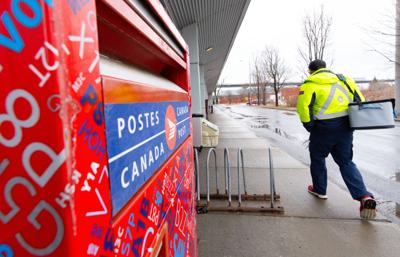Canada Post workers have voted down the Crown corporation’s “final” contract offer, and labour experts say it’s unclear exactly what will happen next in the already bitter dispute.
Members of the Canadian Union of Postal Workers’ urban unit voted the offer down 68.5 per cent to 31.5, while members of their suburban and rural unit turned it down 69.4 per cent to 30.6. Just under 81 per cent of the 53,000 eligible CUPW members cast their ballot.
The voting, ordered by the federal government and monitored by the Canada Industrial Relations Board, opened on July 21 and wrapped up Friday at 5 p.m.
In an emailed statement, CUPW urged Canada Post to come back to the bargaining table, and said the federal government should encourage bargaining to continue.
“The Government has stated its support for unions and fair bargaining. It needs to back its words with action by supporting a return to the bargaining table by both parties for meaningful negotiations. The best collective agreements are negotiated at the bargaining table,” CUPW said. “CUPW is committed to staying at the bargaining table and expects Canada Post to do the same. CUPWŌĆÖs Negotiating Committees stand ready to negotiate good, ratifiable agreements.”
The Crown corporation, which has said it lost $10 million per day during June, said it’s considering its next steps.┬Ā
“This result does not lessen the urgent need to modernize and protect this vital national service,” Canada Post said. “However, it does mean the uncertainty that has been significantly impacting our business┬ĀŌĆö and the many Canadians and Canadian businesses who depend on Canada Post┬ĀŌĆö will continue. We are evaluating our next steps.”
Those next steps, said labour relations experts, could include layoffs. But it all depends, said U of T professor Rafael Gomez, on whether the government gives a clear signal of whether it wants the Crown corporation to implement the restructuring recommended by veteran mediator William Kaplan in May.
“The government really needs to signal to both sides what it wants to do with the Kaplan report,” said Gomez, director of U of T’s Centre for Industrial Relations and Human Resources.┬Ā
Kaplan’s report, combined with rejection of the “final” offer, means Canada Post management has a more free hand to cut costs than it did, said Gomez.
“What actions can Canada Post take on their own that donŌĆÖt require the government changing its official mandate? They probably now have a mandate to do it if they want to,ŌĆØ said Gomez.
The “final” offer vote, argued Brock University labour studies professor Larry Savage, prolonged the dispute without bringing it any closer to a resolution.
“The vote turned out to be major distraction. It didnŌĆÖt bring the parties any closer to concluding an agreement. And arguably, it only drew them further apart,” said Savage. “The path to a negotiated settlement is as muddy as ever.”
Federal Jobs Minister Patty Hajdu urged the two sides to return to the bargaining table.
“It is now up to the parties to return to the table and come to an agreement that works for both of them,” Hajdu said in a post on X. “The Government is monitoring this situation closely and expects the parties to reach a resolution as soon as possible.”
On May 28, Canada Post made what it called its “final” contract offer, which included a 13 per cent wage hike spread over four years, as well as a $1,000 signing bonus.
Two days later, it asked Hajdu to order a vote on the offer. On June 12, Hajdu ordered the CIRB to organize a vote.┬Ā
The order came roughly a month after a key report from Kaplan, who said the Crown corporation was effectively insolvent.
The union has repeatedly criticized the Crown corporation, saying it was trying to┬Āavoid a negotiated settlement. The report was done as part of an Industrial Inquiry Commission ordered in December by then-labour minister Steven MacKinnon, ending a month-long strike which began last November.
Kaplan also said thereŌĆÖs an impasse in bargaining, suggested arbitration wouldnŌĆÖt be a good choice to deal with Canada PostŌĆÖs need for restructuring, and said a “final” offer would be the third option for an end to the dispute.
KaplanŌĆÖs May 15 report suggested the use of community mailboxes, the elimination of home delivery except for parcels, and getting rid of some post office locations and replacing them with franchises.
Kaplan also suggested expanding parcel delivery to seven days a week, with the use of part-time and temporary employees.
CUPW members have been in a legal strike position since May 23, but their strike action has so far been limited to a ban on overtime work.
CUPW actively encouraged its members to vote against the offer.
The Crown corporation has repeatedly insisted that it needs substantial restructuring, and has said it lost $10 million per day in June, calling those losses ŌĆ£unsustainable.ŌĆØ
The association representing CanadaŌĆÖs small businesses pleaded with the federal government to extend CUPW’s previous contract to avoid another work stoppage.
According to the Canadian Federation of Independent Business, small businesses lost between $75 million and $100 million per day during last yearŌĆÖs strike.
“This just brings more uncertainty at a time when small businesses are already struggling to┬Āplan ahead. We canŌĆÖt keep doing this,” said CFIB president Dan Kelly.
A member survey by CFIB last month found that another strike could lead up to two thirds of businesses to ditch Canada Post for good.






























To join the conversation set a first and last name in your user profile.
Sign in or register for free to join the Conversation